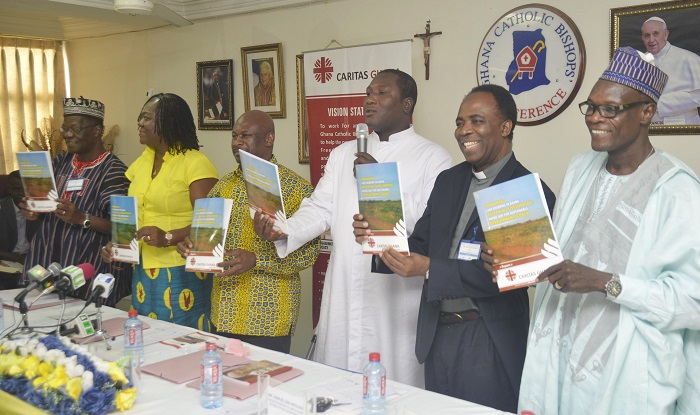
Stakeholders in land administration must collaborate
The Programmes Director of Star-Ghana, Mr Ibrahim-Tanko Amidu, has called for effective collaboration among stakeholders in land administration to stop foreign investors from taking over the country’s lands.
Advertisement
He said foreign invasion of local land aggravated poverty, endangered the environment and posed a serious threat to the realisation of the Sustainable Development Goals (SDGs).
“Issues of access to land and land use are critical to socio-economic development. We must not sit unconcerned for lands to be taken away from the local people by foreign investors and their local agents,” he counselled.
Mr Amidu was speaking at a public forum organised by Caritas Ghana, the charity wing of the Catholic Bishops Conference (CBC) of Ghana, to launch a report on the exploitative land grabbing regime in the country.
Present at the launch were representatives of ministries, departments and agencies (MDAs), civil society organisations (CSOs), faith-based organisations (FBOs), the Lands Commission and a section of the public.
Report
The report, which was on the theme: “Unmasking land grabbing in Ghana: Restoring livelihoods; paving way for sustainable development goals”, was in response to the commitment made at the Africa Conference Against Land Grabbing in Nairobi, Kenya.
Ghana’s participants from the National Catholic Secretariat (NCS) replicated the continental agenda in the country through the CBC during its plenary assembly in May 2016.
The aim had been to unravel all issues relating to exploitation in the acquisition of land from the local people and engage stakeholders to address the situation.
In 1960, Ghana’s population was 6.1 million, as against total land size of 238.535 km2
The country’s population is now estimated to be almost 28 million, putting pressure on the “shrinking” land size.
Foreign investors compete with the local people for the already outstretched land.
Effects on local people
Mr Amidu observed that “exploitation in the land-grabbing regime” did not only create conditions for under-development of local economies but also posed a threat to the safety of the environment”.
“Our vulnerable rural folk are not only deprived of their farmlands and source of livelihood by foreign investors but the system also leads to pollution of water bodies through illegal mining,” he said.
The Executive Secretary of Charitas Ghana, Mr Samuel Zan Akologo, who presented the report findings, said the failure to consult local people before land deals were reached between people in authority and foreign investors did not make for transparency in the agreements.
He said, among other things, that political infiltration into land deals and the lack of strong institutions to protect the rights of local people acted as catalysts to the increasing exploitation in land acquisition.
“The dual governance system between the chiefs and the state leaves a lot of loopholes for exploitation of the vulnerable rural folk in terms of access to land,” he added.
Bad leadership
For his part, the Executive Director of the Africa Faith Justice Network (AFJN), Rev. Fr Aniedi Okure, said bad leadership in Africa and corruption were the reasons foreign investors succeeded in depriving local people of their lands.
“There is an epidemic that has gripped Africa. It is the problem of bad governance by the people we have entrusted with the responsibility to distribute resources to all citizens in an equitable manner but who turn round to compromise that trust,” he said.
He added that the way to go was for the concept of decentralisation to be embraced in Africa to give ownership of local resources to the local people.



